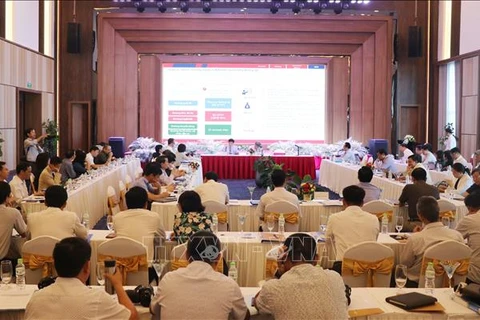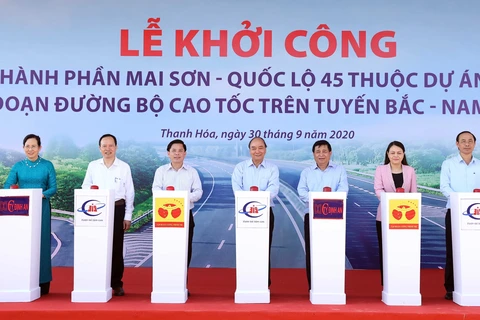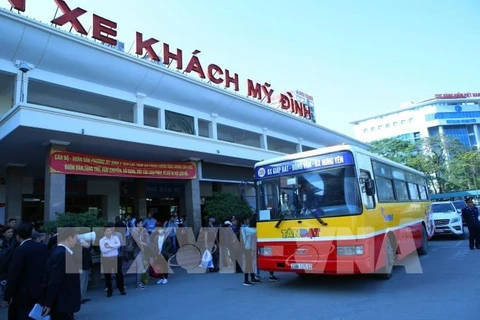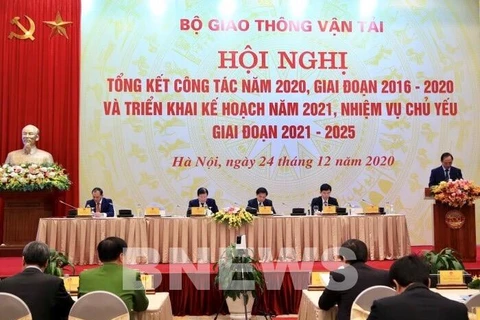HCM City (VNS/VNA) - A major roadway plan proposes an additional 1,000 kilometres of expressways to be built over the next 10 years in the southern region, including the Mekong Delta.
The expressway projects, which are part of the national road network draft plan for the 2021-2030 period with a vision to 2050, were discussed at a workshop held in Can Tho City in the delta recently.
Under the draft plan, the south would have an additional 670km of expressways by 2025 and 300km by 2030.
Of the figure, the delta would include the 150km Can Tho - Ca Mau, 100km Ha Tien - Rach Gia - Bac Lieu and 64km Chau Doc - Can Tho - Soc Trang expressways.
Speaking at the workshop, Deputy Minister of Transport Le Dinh Tho said the draft plan was basically completed and that localities should contribute more ideas for development of the southern region, not just for one locality.
“The scale and quality of the transport network in the delta are still low compared to other regions, so there should be solutions to remove these bottlenecks soon,” he said.
In the 2010-2020 period, about 1,757km of expressways and 6,000km of national highways were completed and opened for traffic across the country.
Of that figure, the Mekong Delta has only 117km of expressways, including the 61.9km HCM City - Trung Luong Expressway operating since 2010, and the 55.1km Trung Luong - My Thuan Expressway under construction.
He said that road surfaces in the Delta should be upgraded and traffic-safety management systems improved. Investment in radial axes connected with national highways is also needed.
The priority should be given to building an axis road linking HCM City with the delta, he said.
A representative of Transport Engineering Design Inc (TEDI), the consultant for the plan, said the plan focused on developing expressway systems by 2030.
The north, central, Central Highlands, southeast and Mekong Delta regions would have 5,414km of expressways in the next 10 years and 8,240km by 2050.
Of the figure, there would be 10 expressways with a total length of 1,258km in the south, and two belt roads in HCM City with a length of 304km.
In addition, 1.969km of 14 primary highways and 3,453km of 25 secondary highways would be developed in the south.
TEDI said the plan would create linkages between regions, industrial zones, urban areas and key economic regions, and use different means of transport.
The plan would help to upgrade highway systems, ensure safety of traffic infrastructure, and handle traffic 'black spots' on national and provincial highways.
Ngo Thinh Duc, Chairman of the Vietnam Association of Bridge and Road Science and Technology, said many planned expressways in the south had yet to start construction.
By 2030, the expressway system must extend to the southernmost province of Ca Mau, he said.
The Dai Ngai Bridge project should be completed by 2025. It is located on National Highway No 60 and is a vital link between the highway and other roads of the southern coastal corridor.
Its construction began in late 2015, but was later delayed due to a shortage of capital.
The bridge, which will reduce traffic pressure on National Highway No 1A, will shorten the travel distance by 70 km between HCM City and the provinces of Tra Vinh, Soc Trang, Bac Lieu and Ca Mau./.
The expressway projects, which are part of the national road network draft plan for the 2021-2030 period with a vision to 2050, were discussed at a workshop held in Can Tho City in the delta recently.
Under the draft plan, the south would have an additional 670km of expressways by 2025 and 300km by 2030.
Of the figure, the delta would include the 150km Can Tho - Ca Mau, 100km Ha Tien - Rach Gia - Bac Lieu and 64km Chau Doc - Can Tho - Soc Trang expressways.
Speaking at the workshop, Deputy Minister of Transport Le Dinh Tho said the draft plan was basically completed and that localities should contribute more ideas for development of the southern region, not just for one locality.
“The scale and quality of the transport network in the delta are still low compared to other regions, so there should be solutions to remove these bottlenecks soon,” he said.
In the 2010-2020 period, about 1,757km of expressways and 6,000km of national highways were completed and opened for traffic across the country.
Of that figure, the Mekong Delta has only 117km of expressways, including the 61.9km HCM City - Trung Luong Expressway operating since 2010, and the 55.1km Trung Luong - My Thuan Expressway under construction.
He said that road surfaces in the Delta should be upgraded and traffic-safety management systems improved. Investment in radial axes connected with national highways is also needed.
The priority should be given to building an axis road linking HCM City with the delta, he said.
A representative of Transport Engineering Design Inc (TEDI), the consultant for the plan, said the plan focused on developing expressway systems by 2030.
The north, central, Central Highlands, southeast and Mekong Delta regions would have 5,414km of expressways in the next 10 years and 8,240km by 2050.
Of the figure, there would be 10 expressways with a total length of 1,258km in the south, and two belt roads in HCM City with a length of 304km.
In addition, 1.969km of 14 primary highways and 3,453km of 25 secondary highways would be developed in the south.
TEDI said the plan would create linkages between regions, industrial zones, urban areas and key economic regions, and use different means of transport.
The plan would help to upgrade highway systems, ensure safety of traffic infrastructure, and handle traffic 'black spots' on national and provincial highways.
Ngo Thinh Duc, Chairman of the Vietnam Association of Bridge and Road Science and Technology, said many planned expressways in the south had yet to start construction.
By 2030, the expressway system must extend to the southernmost province of Ca Mau, he said.
The Dai Ngai Bridge project should be completed by 2025. It is located on National Highway No 60 and is a vital link between the highway and other roads of the southern coastal corridor.
Its construction began in late 2015, but was later delayed due to a shortage of capital.
The bridge, which will reduce traffic pressure on National Highway No 1A, will shorten the travel distance by 70 km between HCM City and the provinces of Tra Vinh, Soc Trang, Bac Lieu and Ca Mau./.
VNA

























